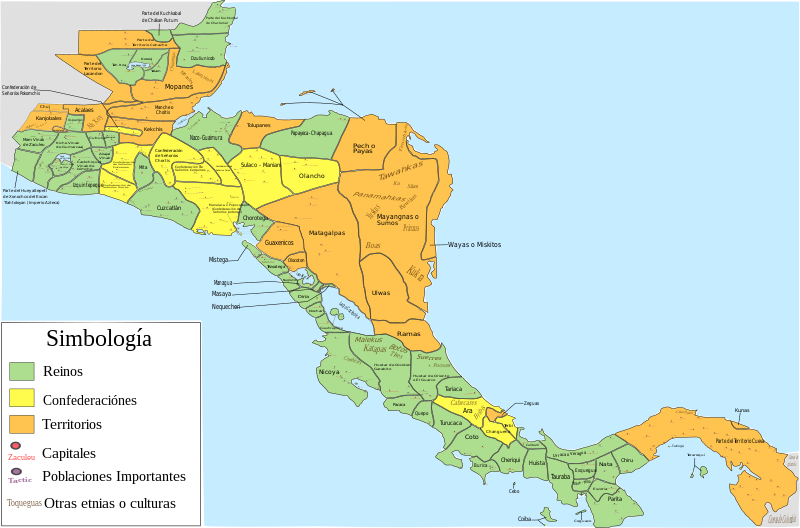File:Centroamerica prehispanica siglo XVI.svg
Appearance

Size of this PNG preview of this SVG file: 800 × 528 pixels. Other resolutions: 320 × 211 pixels | 640 × 423 pixels | 1,024 × 676 pixels | 1,280 × 845 pixels | 2,560 × 1,691 pixels | 250,980 × 165,770 pixels.
Original file (SVG file, nominally 250,980 × 165,770 pixels, file size: 499 KB)
File history
Click on a date/time to view the file as it appeared at that time.
| Date/Time | Thumbnail | Dimensions | User | Comment | |
|---|---|---|---|---|---|
| current | 06:23, 5 December 2022 |  | 250,980 × 165,770 (499 KB) | Juan Miguel | Arreglando algunos detalles |
| 08:34, 5 May 2019 |  | 250,976 × 165,771 (664 KB) | Juan Miguel | Arreglando tamaño de fuente de algunos textos | |
| 08:30, 5 May 2019 |  | 250,976 × 165,771 (663 KB) | Juan Miguel | Arreglando tamaño de fuente de algunos textos | |
| 08:25, 5 May 2019 |  | 250,976 × 165,771 (663 KB) | Juan Miguel | Arreglando algunos textos | |
| 06:18, 5 May 2019 |  | 250,976 × 165,771 (661 KB) | Juan Miguel | Agregó capitales y otras poblaciones importantes, con lo cuál también se mejora los límites entre varias entidades. Además se añaden otras etnias y culturas que pueden formar parte de dicha entidad o ser independientes, y finalmente se amplía la imagen para que los diversos elementos se han más visibles | |
| 05:16, 18 December 2018 |  | 15,744 × 11,093 (276 KB) | Juan Miguel | Correcciones menores | |
| 10:52, 17 December 2018 |  | 15,744 × 11,093 (277 KB) | Juan Miguel | Pequeñas correciones | |
| 03:02, 22 October 2018 |  | 15,744 × 11,093 (278 KB) | Juan Miguel | Arreglo menor en el cuadro de simbología | |
| 02:44, 22 October 2018 |  | 15,744 × 11,093 (278 KB) | Juan Miguel | Arreglo algunas fronteras, pongo colores claros, reduzco la cantidad de colores y año el cuadro de simbología. | |
| 10:13, 16 July 2017 |  | 15,744 × 11,093 (274 KB) | Juan Miguel | Arreglo algunas fronteras y agrego el nombre de los lagos y el color a los océanos. |
File usage
The following 6 pages use this file:
Global file usage
The following other wikis use this file:
- Usage on ar.wikipedia.org
- Usage on ast.wikipedia.org
- Usage on bn.wikipedia.org
- Usage on ca.wikipedia.org
- Usage on es.wikipedia.org
- Historia de Panamá
- Historia de Honduras
- Historia de El Salvador
- Pipil
- Historia de Guatemala
- Historia de Nicaragua
- Historia de América Central
- Historia de Belice
- Señorío de Cuzcatlán
- Idioma náhuat
- Reino quiché de Q'umarkaj
- Usuario discusión:Montgomery/Archivo 15
- Chajoma
- Honduras prehispánica
- Historia precolombina de Honduras
- Historia territorial de Panamá
- Uluas
- Gran Darién
- Usage on eu.wikipedia.org
- Usage on fr.wikipedia.org
- Usage on gl.wikipedia.org
- Usage on io.wikipedia.org
- Usage on ja.wikipedia.org
- Usage on ru.wikipedia.org
- Usage on simple.wikipedia.org
- Usage on zh.wikipedia.org

